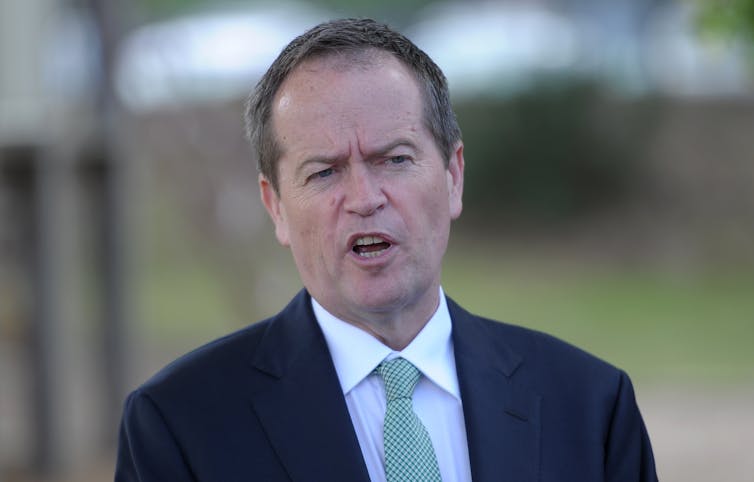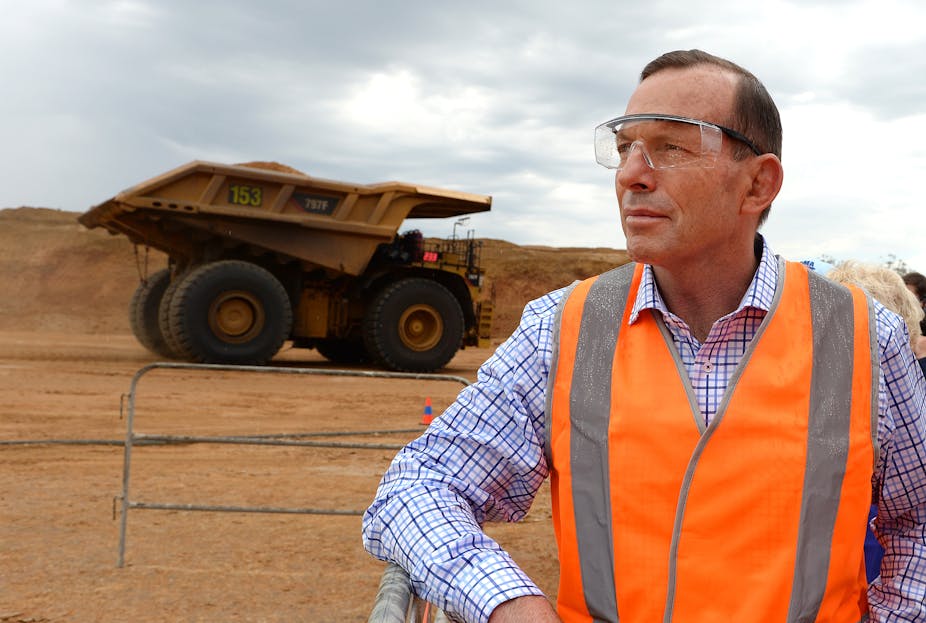Tony Abbott celebrated the opening of a Queensland coal mine on Monday with what he described as an affirmation of his “faith and confidence” in the industry.
“Coal is essential for the prosperity of the world,” he declared, and a change of government at the next election would mean the return of the carbon tax.
“So, if you want to sustain the coal industry, if you want to sustain the jobs, if you want to sustain the towns that depend upon the coal industry, you’ve got to support the Coalition because we support coal – we think coal has a big future as well as a big past.”
It could be 2016, with an election weeks away.
A year into his leadership, Bill Shorten hasn’t committed to much in the way of policy but some months ago he did pledge that Labor will take an emissions trading scheme to the next election. He sharply distinguishes it from a carbon tax.
This can be seen as a bold gamble, or a recognition that for Labor to turn its back on carbon pricing – which has been such a fraught issue for it – would be internally divisive as well as bad policy.
Shorten on Monday was asked whether he could guarantee that any plan to tackle climate change with a carbon price would not increase electricity prices.
He didn’t directly answer the question, instead saying that Australia was “the climate sceptics capital of the world”.
“Labor does believe that we need to tackle carbon pollution, we need to tackle the pollution which is going on in our environment. But what I’ve said very clearly … is we won’t be introducing a carbon tax.”
As Shorten rolls into his second year as leader, he will need soon to turn his carbon position into a convincing policy narrative.
Of course he wants stay focused on the unpopular budget items that have created so many problems for Abbott.

But if Labor is to avoid being done over again on climate policy, it has to go on the front foot and actively start building its case, while also addressing people’s concerns about negatives. The details of a scheme can wait to be fleshed out later but a discussion should begin in earnest.
However, this has complications.
Next year, culminating in the major international climate conference in Paris, could be a crucial marker for Labor. It can’t affect what transpires, but what occurs internationally will have consequences for its ability to sell a carbon-pricing policy to a community that’s been worn out by the previous battle.
“The rest of the world is moving towards taking real action on climate change,” Shorten said on Monday.
The test of that lies ahead. If there is momentum out of the Paris conference, Shorten will be helped by an international tide.
If 2015 doesn’t live up to the hopes of the optimists – well, everyone remembers what happened to Kevin Rudd and his carbon scheme after Copenhagen’s failure.
And that’s a dilemma for Shorten: he should start early to build his case, but he has to have enough flexibility to adjust his plan in light of whatever turns out to be the international reality.
Climate Institute CEO John Connor believes that 2015 carries risks for both sides of politics as they shape up on climate policy for the 2016 election.
Progress abroad could leave the Abbott government in a difficult position, Connor says.
Unlike Copenhagen, countries will put out indicative targets in the early months of next year for what they will sign up for after 2020. These will be deeper than those now in place for 2020.
“The Abbott government has hidden behind the myth that other countries are not doing anything.” But Europe is talking about 40% cuts post-2020 and China is canvassing starting a national emissions trading scheme even as early as 2016, Connor says.
The Australian government is seeking to put itself in a holding position, wanting to see what other countries do before declaring its hand. If there was serious international progress on the cards, it would face a choice: raise its own ambitions or dig in against doing anything much at all.
The latter option, Connor says, “would risk Australia being ostracised and that flows through to international credibility and policy heft”.
How much that would matter to a government facing an election where it wanted to raise a scare about Labor driving up power prices is a moot point.
The past year has been a relatively easy one for Shorten. The government by its budget has given him a free kick; in opposition he has yet to show what he can do on policy. On that front, carbon pricing is shaping up as potentially a tough challenge but one where he also could get some breaks, depending on what happens in a world where coal is losing rather than gaining fans.

